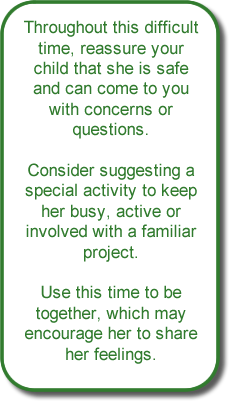MIRECC / CoE
Rocky Mountain MIRECC for Suicide Prevention - Talking to Kids (T2K) about Suicide
 |
|||
 |
 |
 |
 |
Videos | Talking: When & How | Giving Support | What to Say with Examples |
Resources | Feedback
How to Talk to a School Age Child about a Suicide Attempt in Your Family
 It is important to talk to your child about the suicide attempt to help her understand what has happened. Without support of family/friends, children may try to make sense of this confusing situation themselves.
It is important to talk to your child about the suicide attempt to help her understand what has happened. Without support of family/friends, children may try to make sense of this confusing situation themselves.
Sometimes children blame themselves for something they may or may not have done.
When stressed, a child may exhibit changes in behavior, such as acting out, trouble sleeping, or becoming more attached due to insecure, anxious or tearful feelings. It is important to instill a sense of hope, that their parent/relative can get help and get well.
VIDEO: How to Talk to a School Age Child about a Suicide Attempt in Your Family
Talking to School Age Children about a Suicide Attempt
Cómo hablar con su hijo sobre un intento de suicidio en su familia - Niños de Edad Escolar
When should you talk to your school age child?
 If your child was exposed to the crisis and traumatized, she will need some basic understanding of what happened.
If your child was exposed to the crisis and traumatized, she will need some basic understanding of what happened.- If your child was elsewhere and not exposed, consider what she needs to know to make sense of the changes happening in her life.
- The goal is not to overwhelm the child with information, but to answer questions in a calm, non-judgmental way, so she is not afraid to ask more questions.
- If marriage or family problems contributed to a suicide attempt, avoid details that would put your child in the middle, between parents or other family members.
How should you talk with your child?
- Pick a place that is private where your child will feel free to talk. Be aware of what she may overhear from other conversations.
- Keep it simple. Use words your child will understand and avoid unnecessary details. Invite her to ask questions.
- Be aware of your own feelings and how you are coming across. For example, your child could mistake an angry tone of voice to mean that you are angry with her.
- Ask your child age-appropriate questions, and allow her to freely express even difficult or uncomfortable emotions without judgment.
Other ways to support your child:
- By continuing certain, dependable daily routines even in a difficult time, you can help your child feel cared for and safe. For instance, rituals such as picking her up from school, having dinner together and the usual bedtime routine can help reassure her and make her feel safe.
- Get other support people involved (family, friends or clergy). This will benefit you and in turn benefit your child. School age children can also begin to learn caring for themselves during stressful times by paying special attention to good sleep, eating and physical habits.
- School age children also receive special comfort from physical as well as verbal expressions of affection, such as hugs. Offer extra support and attention during this time (such as games, reading together and physical closeness).
- Children of school age, particularly as they approach the teen years will benefit from knowing that they play a valuable role in the family, and can contribute by helping with chores, participating in family volunteer activities, or helping to plan a family member’s return from the hospital.
 As the parent/relative who has been hospitalized becomes stable, visiting him in the hospital, and attending a family therapy session with a mental health professional could be quite helpful and reassuring.
As the parent/relative who has been hospitalized becomes stable, visiting him in the hospital, and attending a family therapy session with a mental health professional could be quite helpful and reassuring.- Consider coordinating with your child’s school by notifying a school counselor or trusted teacher about the situation so that they may support your child and be alert for any signs of prolonged or excessive distress or behavioral concerns.
- Older school age children especially may benefit from discussing boundaries about disclosing information with friends, classmates and on social media outlets.
What to say to your child
Try To |
Examples |
|
Start with her understanding of the situation. |
“I want to talk to you about what happened with Dad. What do you remember from last night?” |
|
Describe what has happened based upon her awareness and understanding of the situation, using age-appropriate language. |
“Mom’s had a difficult time the past couple months, and felt badly enough last night that she hurt herself.” |
|
Inform your child about emotional struggles. |
“Grandpa has been feeling depressed lately. That sometimes makes it hard for him to think of solutions or make healthy choices.” |
|
Address guilt, blame, shame, and responsibility. |
“Sometimes kids can feel like they did something wrong, or that they’re to blame. I want you to know that what’s happening isn’t anyone’s fault.” |
|
Assure her that her family member is getting treatment/care. |
“The doctors at the hospital are helping your sister. They are talking with her and helping her feel better.” |
|
Let her know that her daily routine will stay the same. |
“Even though it is different that Mom is not here, you will still go to school tomorrow.” |
|
Encourage her to express her feelings. Help her to know that her reactions are normal and expected. Invite her to ask questions. |
“What are you thinking about what’s going on with your brother? It’s normal to have a lot of different feelings. Do you have anything you want to ask me?” |
|
Help create a connection between the child and her family member. Tell her when she can expect to see her family member again. |
“Would you like to write a letter or e-mail Dad while he’s in the hospital for a few days? He might like to see the picture you took yesterday too.” |
|
Allow her not to talk if she desires, and to choose who she talks to. Discuss how your child can share information with family and friends. |
“I understand you don’t feel like talking right now, but maybe you’ll feel ready to talk in a few days. You could talk to Grandma too when you go to her house after school tomorrow.” |
|
Let her know you are getting support too. |
“It helps me to talk to your Aunt Maria and also the people at church. After dinner I’m going to walk over to Aunt Maria’s house, would you like to come?” |
|
Let her know it is okay to get support at school. |
“You could also talk about this with your guidance counselor or teacher, Ms. Davis, at school. Would you like to talk to one of them?” |
|
Help your child prepare for a family member’s return if they spent time in the hospital following a suicide attempt. |
“Your sister is coming home tomorrow. Would you like to help me get the house ready? Do you have any questions before we pick her up from the hospital?” |
Resources
Tragedy Assistance Program for Survivors (TAPS) for Youth — www.taps.org/youthprograms/
Grief Camps for kids
A Last Note
 This information is intended to help inform and guide adults when talking with a six to twelve year old child about a suicide attempt in the family. It is not intended to replace the advice of a mental health professional. In fact, it may be best to use this along with professional support if you or your child is struggling with how to talk about this difficult topic.
This information is intended to help inform and guide adults when talking with a six to twelve year old child about a suicide attempt in the family. It is not intended to replace the advice of a mental health professional. In fact, it may be best to use this along with professional support if you or your child is struggling with how to talk about this difficult topic.
It is important to consider your child’s level of development and ability to understand events when deciding how to talk with her. Sticking to the key issues and answering her questions may be all she needs. (“Dad was feeling bad enough that he didn’t want to live, so he had to go to the hospital for help.”)
We'd Like Your Feedback
If you have used the Talking to Children about a Suicide Attempt in Your Family we'd like you to complete a short survey so we can make the guides better. We'd like to know how the guides were used, which guides were used and what would make them better. Take the confidential survey.
Site Map
Last Updated 29 Sept 2021



















